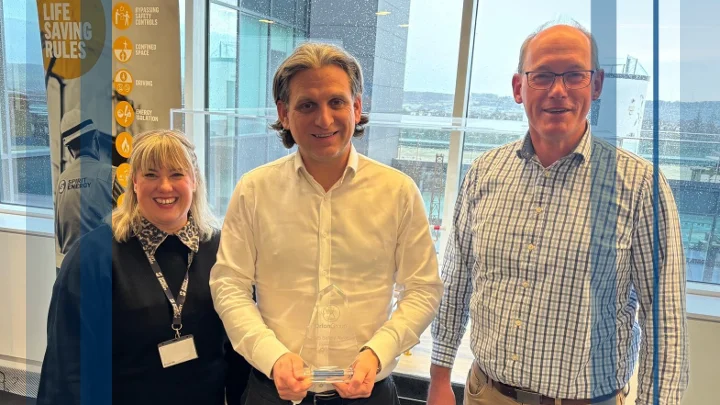The Deepwater Dilemma: Navigating Offshore Recruitment
01 May, 202510 Minutes
Offshore oil and gas operations are facing a serious talent challenge. As projects scale in size and complexity, the demand for highly specialised professionals has never been higher — yet the supply is falling short. From subsea engineers to ROV pilots, offshore roles require a rare mix of technical skill, industry experience, and resilience under pressure.
At the same time, the industry is contending with an ageing workforce, global competition for talent, and stricter regulatory demands. Other sectors, including offshore wind and defence, are also pulling from the same talent pool. The result? A growing recruitment gap that offshore operators can’t afford to ignore.
In this blog, we break down what’s causing the shortage, which roles are most at risk, and what oil and gas companies can do to strengthen their offshore recruitment strategies. Whether you're hiring now or planning ahead, this is a challenge that requires long-term thinking and immediate action.
The Rising Tide of Talent Scarcity in Offshore Recruitment
The offshore oil and gas sector is struggling to hire. The issue isn’t just about headcount. It’s about finding people with the right experience, the right certifications, and the ability to handle the physical and mental demands of offshore work.
There are several reasons for the shortage:
- Many experienced offshore professionals are nearing retirement, with few younger workers coming through to replace them.
- Certification requirements are extensive, meaning new entrants often face long delays or high costs before they can work offshore.
- Other sectors, including offshore wind, defence, and marine research, are hiring for similar roles and pulling from the same pool of talent.
- Some professionals are put off by the lifestyle. Offshore rotations can be tough and are often seen as less appealing than onshore or hybrid alternatives.
This combination of factors means offshore recruitment agencies are working with a much smaller pool of qualified candidates than before. The challenge is less about attracting applicants, and more about finding people who are fully certified, ready to mobilise, and genuinely interested in offshore careers.
Without action, companies could face project delays or safety concerns due to stretched teams. A clearer plan needs to be in place for sourcing, upskilling, and retaining offshore talent over the long term.
Beyond Ordinary Expertise: The Offshore Specialist
Offshore oil and gas roles are some of the most technically demanding in the industry. These aren’t just standard engineering jobs. They require professionals with a rare mix of qualifications, offshore certifications, and the ability to work in remote, high-pressure environments.
From ROV pilots to subsea engineers and offshore HSE personnel, these roles demand:
- Specialised technical training in deepwater systems, remote operations, and high-risk environments
- Extensive certification such as BOSIET, HUET, HSE Level 3 or higher, and role-specific offshore training
- Resilience and reliability to manage isolation, physical demands, and strict safety compliance on site
- Proven experience in real offshore settings, often in rotating shifts or long deployments
This combination is hard to find and even harder to replace. Offshore work isn’t for everyone, and the small number of professionals qualified and willing to do it are in high demand across multiple sectors.
What makes this even more difficult is that many of the skills needed for offshore operations are not taught in academic settings. They are developed over time on rigs, platforms, and vessels. Without structured career development plans in place, companies risk losing this knowledge entirely when senior offshore workers retire. Recruitment alone cannot close that gap. Offshore capability needs to be built intentionally.
The Looming Knowledge Precipice
Offshore oil and gas is facing a critical shortfall in experienced specialists. Many of the engineers and subsea professionals who shaped today’s operational standards are now retiring at pace. This is creating a growing gap between what offshore operations demand and the capabilities the next generation can currently deliver.
These experienced professionals gained their skills during the North Sea boom and have since built decades of insight in live offshore environments. That knowledge isn’t written down. And it’s not easily replaced. Without a steady flow of trained professionals ready to take their place, the risk to both project continuity and operational safety increases significantly.
Younger professionals aren’t entering offshore roles at the scale required. The reasons include slow knowledge transfer, limited structured development, and competing sectors offering faster, more accessible career routes.
Why this is a major concern for offshore recruitment:
- Knowledge drain: Senior offshore engineers are retiring faster than they can be replaced, leaving skill gaps in core areas like subsea design and deepwater systems.
- Limited backfill options: Offshore recruitment agencies are reporting shortages in early-career specialists with relevant offshore certifications and experience.
- Reduced mentorship capacity: Without overlap between senior and junior professionals, companies lose the opportunity to transfer hands-on knowledge.
- Operational risk: Gaps in deep domain expertise can affect both safety and efficiency, particularly in high-pressure, remote environments.
This is not just a training issue. It's a structural problem within the offshore recruitment market. Companies need to invest now in long-term skill-building, internal career progression, and early engagement with the next generation of offshore talent.
The Multi-Sector Talent Competition
Offshore recruitment has become far more competitive in recent years. Where the oil and gas sector once had exclusive access to experienced offshore specialists, that’s no longer the case. Today, the same professionals you’re trying to hire are being approached by multiple industries — often with similar technical demands but a very different appeal.
These include:
- Offshore wind projects offering roles that match deepwater engineering experience but come with the added draw of contributing to sustainability
- Marine research organisations recruiting ROV pilots and subsea specialists for advanced exploration projects
- Defence contractors valuing offshore experience for its resilience and problem-solving, often with the benefit of newer tech and competitive pay
For many professionals, especially those early in their careers, these opportunities are hard to ignore. They offer strong career development, potential for better work-life balance, and a chance to work on high-impact projects in emerging sectors.
This shift means you’re no longer just competing with other oil and gas businesses — you're up against entire industries. If your offshore recruitment strategy hasn’t adapted to this yet, you’ll likely face longer hiring cycles and more candidate drop-off.
The Regulatory Complexity Factor
It’s no secret that offshore recruitment is heavily influenced by regulation. Safety and environmental compliance are non-negotiable, but the time and resources required to meet these standards are now becoming a major hiring roadblock.
Candidates for offshore jobs need a long list of certifications, from BOSIET and CA-EBS to site-specific approvals. Add to that the mandatory upskilling every few years, and it’s easy to see why fewer people enter the offshore workforce — and why hiring takes longer.
For employers, this adds pressure on every front:
- Longer time-to-hire: Candidates often can’t start until they’ve completed essential safety training. That delays onboarding and disrupts project timelines.
- Higher costs: Whether you’re paying for training or waiting on candidates to self-fund, budgets take a hit.
- Limited mobility: Certifications aren’t always transferable across jurisdictions, which narrows the pool of qualified candidates even further.
In a sector already short on skilled workers, these delays make a difficult situation worse.
Why it matters right now
With many experienced offshore professionals approaching retirement and fewer new candidates coming through, oil and gas companies need to be more proactive. Accelerating compliance pathways, partnering with training providers, and working with a specialist offshore recruitment agency can help reduce bottlenecks and maintain project delivery.
Where The Talent Gaps Hit Hardest in Offshore Recruitment
Not every offshore skill shortage is created equal. Some roles are proving especially hard to fill. Without these professionals in place, operations slow down, costs go up, and safety risks increase. Here’s where the biggest capability gaps are in offshore recruitment right now.
Subsea engineers: Essential but increasingly rare
These specialists keep deepwater infrastructure running, from wellheads and flowlines to control systems. Their expertise is central to safe and continuous operations. But many are retiring, and younger engineers often lack real-world offshore experience.
Why it matters: Without subsea engineers, both new project development and routine maintenance grind to a halt. This is one of the most urgent priorities for any oil and gas recruitment agency supporting offshore projects.
ROV pilots: technical skills in short supply
As offshore work gets deeper and more complex, remotely operated vehicles (ROVs) are relied on for everything from inspections to interventions. But operating this technology takes specialist training, spatial awareness, and on-the-job confidence — a rare mix.
Why it matters: Demand now exceeds supply. Without ROV pilots, you're flying blind.
Offshore construction and maintenance: losing hands-on expertise
These are the people who manage heavy-lift operations, structural upgrades, and eventual decommissioning. Their work is physically demanding and highly specialised, but many are approaching retirement.
Why it matters: Offshore facilities can't function without this knowledge on deck. Offshore recruitment agencies need to prioritise succession planning and mentoring to keep the skill flow moving.
HSE and compliance professionals: the backbone of operational safety
These roles are non-negotiable. You need people who can interpret and apply complex regulations across different jurisdictions, all while understanding the offshore environment firsthand.
Why it matters: The risk of fines, shutdowns, or incidents rises without this expertise. Hiring experienced HSE professionals with sector-specific knowledge is now a critical part of any oil and gas recruitment strategy.
The Changing Career Equation
Beyond the structural supply issues, companies must confront the reality that fewer candidates are choosing offshore careers—a trend driven by several key factors:
The Sustainability Imperative
Many technically skilled professionals, particularly from younger generations, are drawn to renewable energy sectors that align with personal values around sustainability and environmental impact. Offshore wind, in particular, offers similar technical challenges while positioning candidates at the forefront of energy transition.
The Work-Life Balance Shift
The traditional offshore rotation—typically involving weeks away from home in physically demanding conditions—presents significant lifestyle challenges. As workplace expectations evolve across industries, the sacrifices inherent in offshore schedules face increasing scrutiny from potential candidates who prioritise work-life balance.
The Certification Gauntlet
The extensive training requirements and certification costs create substantial barriers to entry for those considering offshore careers. Candidates may opt for sectors where their technical education translates more directly into job eligibility, without additional certification hurdles.
The Compensation Realignment
While offshore roles have traditionally commanded premium salaries to compensate for challenging conditions, other sectors now offer comparable compensation packages, often with more conventional working arrangements—shifting the value proposition for potential candidates.

Charting a New Course: Strategic Recruitment Solutions
For offshore operators committed to maintaining operational excellence, addressing these recruitment challenges requires a comprehensive, multifaceted approach:
Strategic Workforce Planning: Anticipating Tomorrow's Needs
Rather than responding to staffing gaps as they emerge, companies must develop comprehensive talent strategies that:
- Forecast future needs based on project pipelines and retirement projections
- Create clear development pathways to grow critical capabilities internally
- Establish succession plans for key technical and leadership roles
This forward-looking approach reduces operational vulnerability and provides stability for long-term planning.
Capability Development: Cultivating Offshore Expertise
Companies that invest in talent development gain a significant competitive advantage by:
- Sponsoring apprenticeships and graduate programmes that introduce new talent to offshore careers
- Creating accelerated certification pathways that reduce barriers to entry
- Establishing knowledge transfer initiatives to capture critical expertise before retirements
These investments, while substantial, deliver returns through improved recruitment success and reduced operational risk.
Employer Value Proposition: Reframing the Offshore Career
Offshore operators must refresh how they present career opportunities to potential candidates by:
- Highlighting the sophisticated technology and engineering challenges that make offshore work intellectually stimulating
- Demonstrating commitment to work-life considerations through rotation optimisation and wellbeing initiatives
- Emphasising competitive compensation and the financial advantages of offshore career paths
- Repositioning offshore work as part of the broader energy transition rather than separate from it
A compelling narrative helps attract candidates who might otherwise overlook offshore opportunities.
Specialist Recruitment Partnerships: Accessing Expert Networks
The complexity of offshore hiring demands specialised recruitment support through:
- Tapping into established networks of pre-qualified offshore professionals
- Leveraging industry-specific knowledge to assess technical capabilities accurately
- Accessing international talent pools to expand recruitment reach
Partnering with recruiters who understand both the technical requirements and the personal attributes needed for offshore success ensures higher-quality hires and improved retention.
Mastering the Offshore Talent Challenge: Final Thoughts
The offshore recruitment challenge is not temporary. It reflects deeper shifts across the oil and gas workforce, from early retirements to growing competition from industries like offshore wind and defence. Traditional hiring methods no longer deliver the talent required to maintain operational safety and performance.
To stay ahead, businesses need to evolve their approach. That means planning for future workforce gaps, developing clear training pipelines, and building partnerships with offshore recruitment agencies that understand the complexity of the sector. The companies that move first will gain the confidence, capability, and continuity needed to deliver long-term results.
Take Decisive Action Today
At Orion Group, we specialise in offshore and oil and gas recruitment, helping businesses secure hard-to-find talent for complex operations. Whether you're hiring ROV pilots, subsea engineers, or HSE professionals, we provide access to a pre-vetted network of professionals ready for deployment.
We offer:
- International recruitment reach
- Industry-specific vetting processes
- Support with strategic workforce planning
- Deep knowledge of downstream and offshore recruitment challenges
Speak to Orion’s offshore specialists today and build a workforce ready for what’s next.



